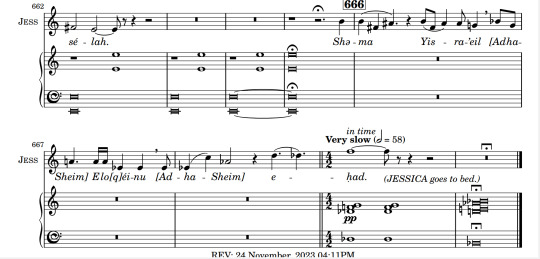#we write it like g-d so we can avoid the namesearch when we shittalk
Explore tagged Tumblr posts
Text

hello all! on this Trans Day of Visibility, i'm so pleased to announce the release of the full Volume I of Siddur Davar Ḥadash, an attempt to imagine a de-gendered, de-stigmatized Jewish liturgy for Shabbat and Festivals. this full release includes the full morning and afternoon liturgies in addition to the previously available evening service, and all Hebrew prayers are fully transliterated and translated into English. the siddur is freely available as a PDF, HTML page, and plaintext file; click on over and check it out if it seems like something you'd be into!
#siddur#prayerbook#Judaism#Jumblr#Trans Day of Visibility#TDoV#trans Judaism#queer Judaism#disabled Judaism#my kind of theology#we write it like g-d so we can avoid the namesearch when we shittalk#Siddur Davar Ḥadash#my work
47 notes
·
View notes
Text
sometimes when the sages are like "this verse about leprosy proves that the sun is red despite appearing white because of a strained pun involving a ruling about buying wheat", i'm like "sure besties, whatever you say", but then sometimes they go on to explain that the sun is red in the morning because it is rising over all the roses in the Garden of Eden and taking on their reflected hue and i need to go lie down on the floor until i recover
#Jumblr#daf yomi#Bava Batra#Bava Batra 84#Sunrise#talmud#Talmudic poetry#love the sages' absolute commitment to anti-empiricism#we can learn nothing unless it is contained somehow in the text of Torah#observation is useless but puns are all-powerful#we write it like G-d so we can avoid the namesearch when we shittalk
18 notes
·
View notes
Text


OVO WHAT'S THIS
Siddur Davar Ḥadash is an attempt to imagine one form that a de-gendered, de-stigmatized, Diasporist liturgy might take. All the prayers are fully transliterated and translated with all-new translations, all of which are released into the public domain to use and edit without restriction
And now!!! You can get your very own hard copy! Wow!!!
(And if you'd like to read some more personal thoughts about this project and what's ahead, I just put out a little newsletter with that very information! Neat!)
#Judaism#siddur#siddurim#Jewish prayerbooks#trans Judaism#queer Judaism#Diasporist Judaism#disability-centric Judaism#(idk exactly what the best tag is for that; the work around ableism is a huge part of this project but#i feel like it has been a little neglected in how people talk about it)#inclusive Judaism#inclusive siddur project#Siddur Davar Ḥadash#my siddur#we write it like g-d so we can avoid the namesearch when we shittalk
17 notes
·
View notes
Text
it's the new year for the trees! who wants to learn some incredibly niche Hebrew grammar great wonderful come on in and have a seat
so the name of this holiday is Tu biShvat, literally "the fifteenth [day] in [the Hebrew month of] Sh'vat". and you might wonder why the name of the month looks like it's "Shvat" in the full name of the holiday and "Sh'vat" in the translation i gave above, and that is what i'm here to explain
you see, Hebrew has this vowel called a sh'va, and it's kind of a placeholder vowel when there isn't another vowel attached to a consonant. under certain conditions, however, that little vowel becomes . . . not so silent. for example, if you're smack bang in the middle of a word and there are two sh'vas in a row, Hebrew doesn't like that, and the second one becomes a quick, unstressed, kind of indistinct vowel sound that's similar to the second E in the word celebrate. another time that this happens is when the very first letter of a word has a sh'va under it, as in the word sh'va itself. normally, i like to transliterate a sh'va with an IPA schwa (which looks like an upside down e), but my current keyboard doesn't have the shortcut installed that lets me type that quickly, so i'm using an apostrophe, which is another very common way of transcribing it in English. (some people also use just a regular E; the sh'va isn't an English vowel, so there's a fair bit of variation in how it gets carried over into English)
so that's one part of the puzzle. the second, believe it or not, is just the word "in". some Hebrew prepositions can't really exist as separate words, they just exist as prefixes that get tacked on to the front of words they apply to. "b", meaning "in" (or "with" or a number of similar things depending on context), is one of these! and by default, when it gets tacked on to the front of the word, it takes a sh'va for its vowel
but! in the case of Sh'vat, that causes problems. because when there are two sh'vas in a row, as mentioned above, it's the second one that gets pronounced, while the first remains silent. but when the first vowel of a word is a sh'va, that sh'va is pronounced. and Hebrew really hates having two audible sh'vas in a row, which is what the rules seem to say should happen here
so instead, Hebrew sort of smooshes the sh'vas together, and the first one becomes a different vowel so that the second one can become silent again. that new vowel is a long I like the I in zine, which is how you get "biShvat" with no audible sh'vas in sight. pretty neat, huh!
and now, if you're a prescriptivist pedant, You Too can be Vaguely Annoyed whenever you see someone ignore the sh'va rules and write b'Sh'vet, bShevet, or other variations on that theme :P
#tu bishvat#this bothers me to an unreasonable degree because i am. alas. the Worst#Hebrew#sh'va rules#happy birthday to the TREES#we write it like g-d so we can avoid the namesearch when we shittalk
11 notes
·
View notes
Text
yeah, you can designate any kind of candle as a Ḥanukah candle. the source here is Shabbat 21b — the sages discuss a bunch of things you're not allowed to light for shabbat lights and then ask whether you can use those things for Ḥanukah lights, and the answer is that because you can't use the lights for anything, there's no concern that you'll adjust or relight them if they burn poorly, so you can use any kind of candle, oil, or wick on Ḥanukah and it's fine. this is affirmed in the Shulḥan Arukh (Oraḥ Ḥayim 673:1), which p much settles it in my book
so as long as your wax play candles are a) candles that b) burn, you can use them for Ḥanukah lights

#in general hilkot Ḥanukah are very slight#there's a *lot* of hidur mitzvah that gets stacked on top#but the core is minimal#in part i think because ḥazal are just. not very comfortable with it as a holiday#which like#given the historical context of Jewish rebellions against empire in their day#and also like. Maccabean corruption and violence against Jews and etc#(sorry if this is how you find out that the Maccabees are complicated in the way all humans are)#anyway#i'm glad there's the addition about wax types#a lot of Ḥanukah candles are made with beeswax which you should ABSOLUTELY NOT use for wax play#paraffin is also very common and is less YIKES but still hotter than ideal#i mean RACK and all so you do you i guess#but it's the “aware” there that feels very pertinent here#double anyway#i am arguing with some of these people in the beit midrash#we write it like g-d so we can avoid the namesearch when we shittalk
2K notes
·
View notes
Text
watching a production of Schoenberg's Moses und Aron and while i am still not That invested in it as an opera, for the scene when Moses comes back down with the Ten Commandments to find the Golden Calf fiasco, instead of having them on two tablets, he has them written in giant black letters on an enormous sheet (like, almost half the size of the entire stage) of brilliant white paper draped around his shoulders like a seemingly infinite cape, and when the moment comes for them to be shattered, the whole chorus descends on the sheet and tears it into pieces with their bare hands, and i gotta say that is an effective choice that i am going to thinking about forever and may well steal someday
#Moses und Aron#Arnold Schoenberg#art#design choices my beloved#opera#we write it like G-d so we can avoid the namesearch when we shittalk#attn#sigmastolen#this seems like something that you would find visually striking to imagine at least
3 notes
·
View notes
Text
observing Pésaḥ by refraining from seltzer and only drinking still
#jumblr#Pésaḥ#Passover#Pesach#only mostly joking with this one tbh#. . . actually i think i am probably going to do this#anyway#kashrut#we write it like g-d so we can avoid the namesearch when we shittalk
5 notes
·
View notes
Text

i can be trusted with 20th-century compositional techniques :) :) :)
#sheet music#my works#The Quality of Mercy#nefariousness and nonsense#we write it like g-d so we can avoid the namesearch when we shittalk#image description is in the alt text#but uh. sheet music is hard to describe; i did my best
5 notes
·
View notes
Text
Cowboy Torah time? more like Judais—



My friend has a Janakh.
#wait#hang on#about to blow this thing wide open#we write it like g-d so we can avoid the namesearch when we shittalk
1K notes
·
View notes
Text
someone just e-mailed my synagogue listserv asking for advice on fixing outdated heating equipment, but the subject line they chose was "service for old radiators" and for a moment i really did think they were trying to organize a minyan to say kadish for their furnace
#a day in the life#we write it like g-d so we can avoid the namesearch when we shittalk#. . .#found in translation
4 notes
·
View notes
Link
h e l l o
some of you may have seen me mention that i’ve been working on a Friday evening siddur? well! it has been released into the wilds! this siddur uses a modified and expanded version of the Nonbinary Hebrew Project to de-gender all references to G-d, the worshiper, and groups of people in the liturgy, and it also finds alternatives — in Hebrew and in English — for passages that are sexist, ableist, xenophobic, or otherwise stigmatizing
all Hebrew in the siddur is fully transliterated, and it is available as a PDF, in a HTML version with several adjustable settings, and as a plaintext file. the entire work is in the public domain so that you can download, distribute, and make entirely new versions of it without restriction or cost. i hope that this might offer a way to connect with the Divine to those who have felt alienated by aspects of the traditional liturgy, and also be a stepping stone to many more inclusive siddurim to come
#Jumblr#Judaism#trans#nonbinary#siddur#Jewish#prayerbook#Jewish prayerbook#Jewish tumblr#Judaism tumblr#Siddur Davar Hadash#siddurim#Judaism blogging#we write it like g-d so we can avoid the namesearch when we shittalk
21 notes
·
View notes
Note
i love your siddur! i wanted to know if you’ve ever read siddur sha’ar zahav or siddur masorti?
ah, thank you so much! i've only seen excerpts from Siddur Sha'ar Zahav, but i have a copy of Siddur Masorti and i'm very much looking forward to their upcoming shabbat volume; i think the work Isaac and Adam have done is really phenomenal and a great service to the Jewish world at large. i've been quite taken with the excerpts from SSZ that i've seen, but i can't really say much about the prayerbook as a whole, since i haven't really been able to spend time with it in the same way that i have with SM. i'd like to pick up a copy one of these days, but other things have been a higher priority, so i haven't quite managed it yet
#my conversations#Siddur Sha'ar Zahav#Siddur Masorti#we write it like g d so we can avoid the namesearch when we shittalk
0 notes
Text
putting the nya~~ in minyan—

ok but like... concept
#im sorry im sorry im trying to figure out how to delete it#(no im not >:) )#putting the nya in minyan#love is stored in the fuzzy triangles#we write it like g-d so we can avoid the namesearch when we shittalk
928 notes
·
View notes
Text
there’s this weird thing that happens sometimes when people look at the history of How Jewish Liturgy Got To Be The Way That It Is Right Now where people will point to the history of a specific prayer and be like “well, this got added to the liturgy in this specific social and political context and it had to be written in this kind of weird and coded way because at the time gentile authorities in the place where it was added to the prayer service would literally raid synagogues, look at the prayer texts, and Do A Pogrom if they thought the prayer texts were Too Spicy”, and then they’ll say “...and therefore that means in our current — wildly different! — social and cultural context we must keep doing these prayers in the exact same way, because we are simply Powerless to change tradition in the way that literally every previous generation of Jews has changed tradition no like seriously every single one we can see these changes continuously in the liturgy it is actually constant at no point is Judaism static and fixed until Right Now when we have to Stop Everything”
and it’s just like . . . why? even if we grant, wholesale, that in the context of Jewish communities living under absolute Christian monarchies that did big anti-Jewish mass violence whenever the government was at war or needed to distract from its own failings, it was reasonable or justifiable for Jewish communities to add a prayer that the government Not Fucking Do That, and to couch it in language that read as “wow! we hope the King does well and that the state is prosperous and safe and strong and great and excellent and etc etc etc!” so that when the censors busted in and read the prayerbooks they wouldn’t find anything Subversive, even if we grant all that, it doesn’t follow that we therefore have to keep praying those prayers in the US today. is the US doing pogroms against Jews whenever there’s a recession? no. do police raid our shuls and read our prayerbooks for subversive prayers? no. shinui ittim — the times have changed, and our prayers can and must change with them! the very arguments being mustered above (not you, awbrainno, but the people arguing against you badly) pointing out that these prayers were added in a specific context for a specific purpose are the arguments proving that these prayers can and must change now that the circumstances we are praying them in have changed. anything else relegates Judaism to a dead practice, a rote regurgitation of meaningless texts, words without intent in ways that our tradition clearly teaches is a sin
Remove the prayer for our country from Jewish liturgy, tbh. Tired of hearing about G-d protecting a morally bankrupt nation. Justice means abolishing this failed state, not tying it to my religion.
#if we are not prophets we are the children of prophets#if we do not know how to light the BST's fire we will light a new fire#Judaism is a living tradition and it belongs to us#jesus fucking christ#nationalism is idolatry#we write it like g-d so we can avoid the namesearch when we shittalk
125 notes
·
View notes